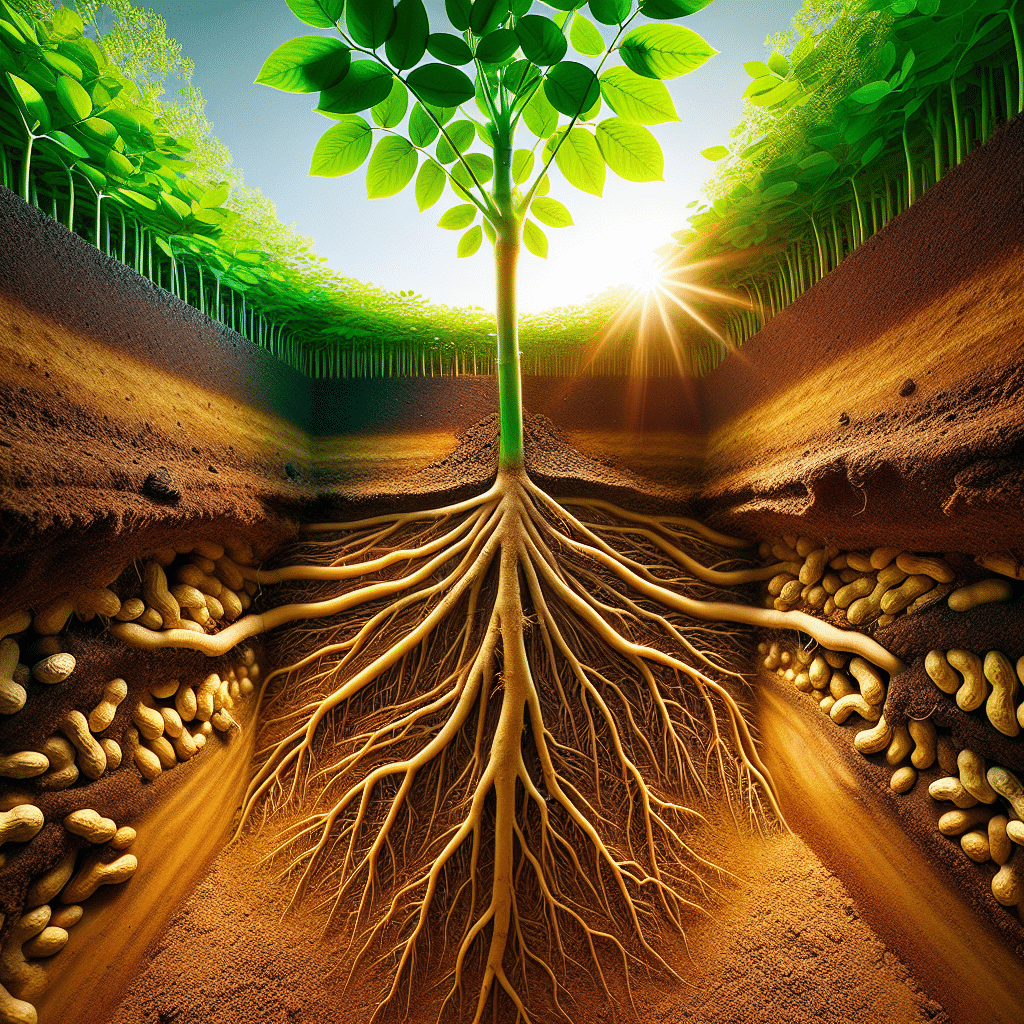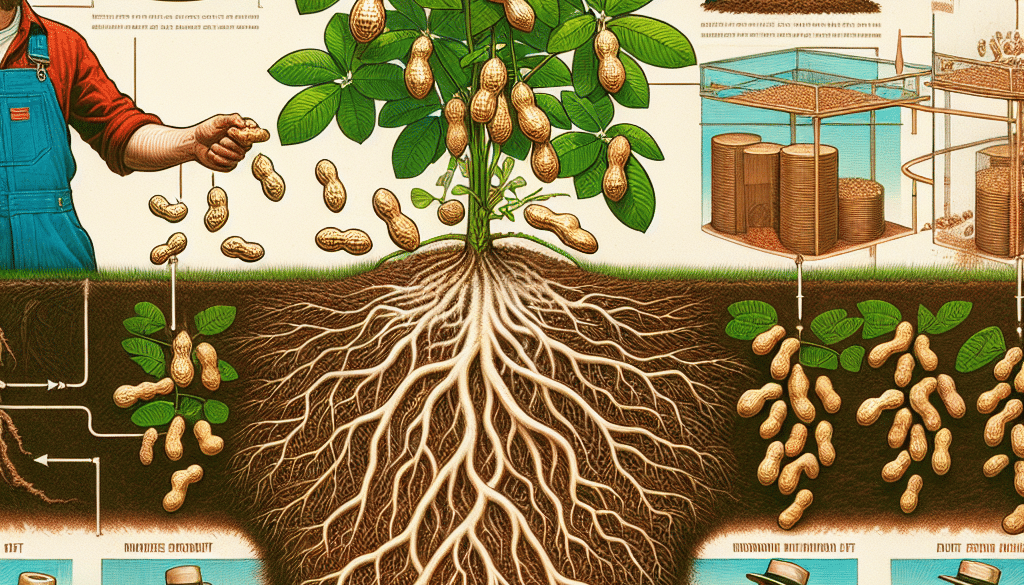Ground Net: Unearthing Peanut Essentials
-
Table of Contents
- Peanut Protein Power: Harnessing the Nutritional Benefits
- The Nutritional Profile of Peanuts
- Cultivating the Groundnut
- Health Benefits of Peanut Consumption
- Peanut Protein in Sports Nutrition
- Case Studies and Statistics
- Applications of Peanut Protein
- Conclusion: Embracing Peanut Protein
- Discover ETprotein’s Premium Peanut Protein Products
Peanut Protein Power: Harnessing the Nutritional Benefits

Peanuts, often mistaken as nuts, are actually legumes that have become a staple in diets around the world. Known for their rich flavor and high protein content, peanuts play a significant role in both culinary and nutritional contexts. This article delves into the essentials of peanuts, exploring their nutritional benefits, cultivation, and applications, particularly focusing on peanut protein as a key component of a healthy diet.
The Nutritional Profile of Peanuts
Peanuts are a powerhouse of nutrients, offering a variety of health benefits. They are an excellent source of protein, essential fats, vitamins, and minerals. Here’s a breakdown of their nutritional components:
- Protein: Peanuts contain about 25-30% protein, making them a great source for vegetarians and vegans.
- Healthy Fats: Rich in monounsaturated and polyunsaturated fats, peanuts can help maintain healthy cholesterol levels.
- Fiber: The dietary fiber in peanuts aids in digestion and promotes satiety, which can help with weight management.
- Vitamins and Minerals: Peanuts are packed with vitamins E, B6, niacin, and folate, as well as minerals like magnesium, phosphorus, and potassium.
- Antioxidants: They contain bioactive compounds like resveratrol, which have antioxidant properties.
Cultivating the Groundnut
Peanuts, also known as groundnuts, are cultivated worldwide, with China, India, and the United States being the top producers. The cultivation process is unique as the peanut plant flowers above the ground, but the peanuts themselves develop below the surface. Here’s a glimpse into the peanut cultivation process:
- Planting: Peanuts are planted after the last frost when the soil temperature reaches at least 65°F (18°C).
- Growth: The plants flower and, after pollination, pegs grow downward into the soil where the peanuts develop.
- Harvesting: After about four to five months, the plants are harvested. The peanuts are then dried to reduce moisture content for storage.
Health Benefits of Peanut Consumption
Regular consumption of peanuts has been associated with numerous health benefits. Here are some of the most compelling reasons to include peanuts in your diet:
- Heart Health: Studies have shown that peanuts can reduce the risk of cardiovascular disease due to their healthy fat profile.
- Weight Management: The fiber and protein in peanuts contribute to feelings of fullness, helping to prevent overeating.
- Diabetes Prevention: Peanuts have a low glycemic index and can help regulate blood sugar levels.
- Reduced Risk of Gallstones: Regular peanut consumption has been linked to a lower risk of gallstone formation.
Peanut Protein in Sports Nutrition
Peanut protein is gaining popularity in the sports nutrition sector due to its high-quality protein content and amino acid profile. Athletes and fitness enthusiasts often turn to peanut protein for muscle repair and growth. It’s a cost-effective and allergen-friendly alternative to other protein sources like whey or soy.
Case Studies and Statistics
Several studies have highlighted the benefits of peanut protein. For instance, research published in the “Journal of Food Science and Technology” found that peanut protein hydrolysate could promote muscle recovery after exercise-induced damage. Moreover, the USDA reports that peanuts contribute over 4 billion dollars to the US economy annually, underscoring their economic significance.
Applications of Peanut Protein
Peanut protein isn’t just for eating straight out of the shell. Its applications are diverse and include:
- Protein Powders: Peanut protein is often used in powdered form as a supplement.
- Energy Bars: Many energy and protein bars feature peanuts or peanut butter as a primary ingredient.
- Meat Alternatives: Peanut protein can be used to create plant-based meat substitutes.
- Baking: Peanut flour can add a protein boost to baked goods.
Conclusion: Embracing Peanut Protein
In conclusion, peanuts offer a wealth of nutritional benefits that can be harnessed through various forms of consumption. From supporting heart health to aiding in muscle recovery, the humble peanut is more than just a snack; it’s a versatile and essential component of a balanced diet. By incorporating peanut protein into your meals, you can enjoy the numerous health benefits it provides.
Discover ETprotein’s Premium Peanut Protein Products
If you’re looking to incorporate high-quality peanut protein into your diet, ETprotein offers a range of products that cater to your needs. Their peanut protein is characterized by a neutral taste, non-GMO, and allergen-free attributes, making it an excellent choice for anyone looking to boost their protein intake with a plant-based option.
ETprotein’s commitment to quality and customer satisfaction makes them a top choice for consumers and businesses alike. Whether you’re a food manufacturer seeking to enrich your products with plant-based protein or an individual looking for a nutritious supplement, ETprotein has you covered.
For more information or to sample their products, reach out to ETprotein and discover how their peanut protein can benefit your health and wellness journey.
About ETprotein:
ETprotein, a reputable protein Chinese factory manufacturer and supplier, is renowned for producing, stocking, exporting, and delivering the highest quality organic bulk vegan protein and plant proteins. They include Organic rice protein, clear rice protein, pea protein, clear pea protein, pumpkin seed protein, sunflower seed protein, mung bean protein, peanut protein etc. Their offerings, characterized by a neutral taste, non-GMO, allergen-free attributes, cater to a diverse range of industries. They serve nutraceutical, pharmaceutical, cosmeceutical, veterinary, as well as food and beverage finished product distributors, traders, and manufacturers across Europe, USA, Canada, Australia, Thailand, Japan, Korea, Brazil, and Chile, among others.
ETprotein specialization includes exporting and delivering tailor-made protein powder and finished nutritional supplements. Their extensive product range covers sectors like Food and Beverage, Sports Nutrition, Weight Management, Dietary Supplements, Health and Wellness Products, and Infant Formula, ensuring comprehensive solutions to meet all your protein needs.
As a trusted company by leading global food and beverage brands and Fortune 500 companies, ETprotein reinforces China’s reputation in the global arena. For more information or to sample their products, please contact them and email sales(at)ETprotein.com today.














